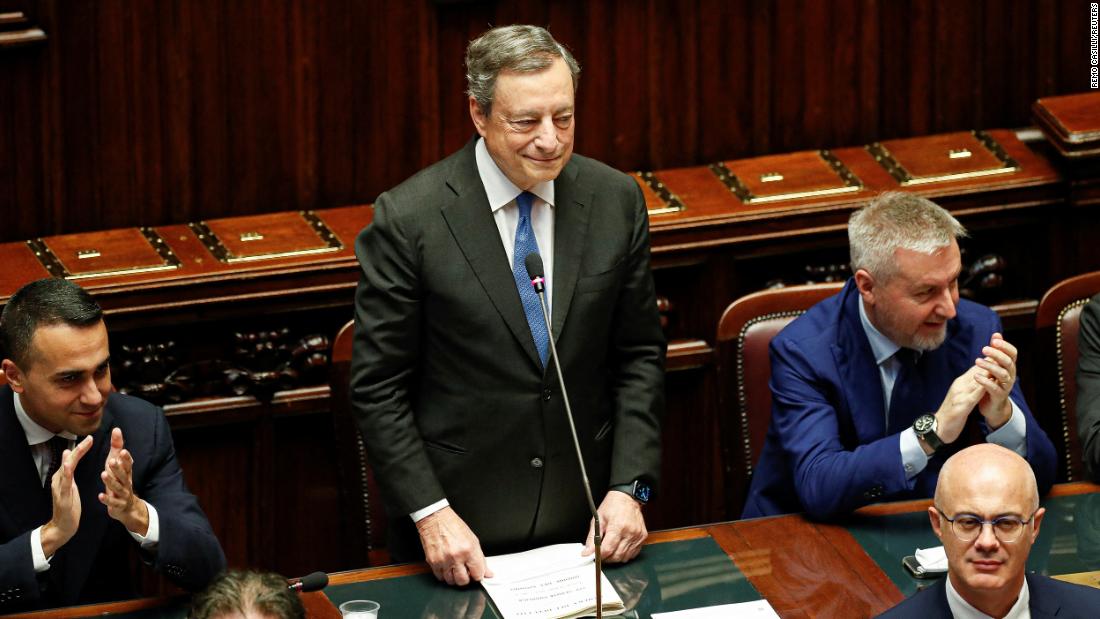
Now, Italy’s President Sergio Mattarella will meet with the speakers of Parliament, with the next step being a call for a snap election — likely to take place as early as this fall.
The centrist leader’s resignation comes despite his popularity among many inside the country and support from world leaders, who view him as an important European voice in standing up to Russian President Vladimir Putin and his war in Ukraine.
Here’s why Draghi’s resignation not only presents a challenge for the future of Italy — but also for Europe.
A political pandora’s box
Draghi, a prominent economist unaffiliated with any political party, became prime minister in February 2021, leading a cabinet of ministers from across the country’s vast political spectrum.
He’s the fifth prime minister to lead the country in just eight years, following the resignation of Giuseppe Conte in early 2021 over his handling of the Covid-19 pandemic.
The former European Central Bank chief won the moniker “Super Mario” for saving the euro during Europe’s sovereign debt crisis. He worked closely with finance minister Daniele Franco to prepare a reforms plan for Italy that will allow it to obtain a 209-billion euro package from the European Covid-19 recovery fund.
However, last week, 5-Star withdrew its support in a parliamentary confidence vote on an economic package designed to tackle Italy’s cost-of-living crisis.
Draghi had previously said he would not lead a government that did not include 5-Star. Meanwhile, the hard-right League and centre-right Forza parties have dismissed the possibility of staying in government with 5-Star, leaving the government on the brink of collapse and sending the FTSE MIB, Italy’s main stock market, down more than 2.5%.
With Draghi’s resignation and its government in chaos, Italy will now have to wait for elections to pass any reforms and to pass its 2023 budget. The crisis will affect ordinary Italians, as without a functioning government, Italy will not be able to access billions of euros from the EU’s Covid-19 fund.
A blow for Ukraine
Draghi has been a key figure in the West’s response to Russia’s war in Ukraine. He was one of the first European leaders to propose sanctions against Russia, including targeting its oligarchs and ratcheting up pressure on its central bank.
He has also supported Ukraine’s bid for EU candidacy.
Last month, he met with Ukrainian President Volodymyr Zelensky in Kyiv on a visit to underline his support, alongside German Chancellor Olaf Scholz, French President Emmanuel Macron and Romanian President Klaus Iohannis, despite a growing backlash in Italy over sanctions and aid to Ukraine.
In his last address before his resignation, Draghi warned the Senate that turmoil in Italian politics could leave an opening for Russia. “We need to block Russian interference in our politics and society,” he said.
Russia is watching
He added, “Now I doubt we can send arms [to Ukraine]. It is one of the many serious problems.”
Rome’s attitude toward Moscow could shift after the elections, with Putin sympathizers among those vying for power.
Matteo Salvini, the leader of the far-right League Party who has made many trips to Moscow, famously posted a selfie of himself wearing a t-shirt adorned with Putin’s face from the city’s Red Square prior to the invasion. And Putin ally Silvio Berlusconi, who also sits in the center-right coalition, could rattle the Western European alliance.
A headache for Italy and Europe?
Annual inflation in the European Union jumped to 9.6% in June. It reached 8.6% for the 19 countries that use the euro.
And the wildfires that have swept across Spain and France could also put a dampener on economic activity.
With Italians now facing an early election, investors fear that right-wing factions in the country could gain increased support at the ballot box, raising questions about EU cohesion at an important juncture.
Italy’s center-right is led by Euroskeptics including the League’s Salvini and the Brother of Italy party’s Giorgia Meloni, though some parties in the coalition have taken a softer stance on the EU. And while the Democratic Party is expected to maintain its pro-Europe position, it is not expected to govern.
Meanwhile, the 5-Star Movement is made up of both Euroskeptics and EU supporters, but it’s not expected to do well in upcoming elections either.
CNN’s Sharon Braithwaite, Julia Horowitz and Zahid Mahmood contributed reporting.
